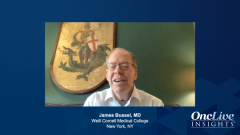
Sequencing in ITP
Drs Piatek and Bussel discuss sequencing of therapies in ITP.
Episodes in this series

James Bussel, MD: Let’s finish up talking about treatment sequencing. We talked about how rituximab might be particularly good in younger women, and it’s better earlier in the disease. Craig, if you use it later, you might still get responses, but it’s much less likely you’ll have a “curative” response. We all probably like TPO agents because, as you’ve mentioned, they have a high response rate and generally are safe. They often can be used for a long period of time. You highlighted appropriately the risk of thrombosis in that setting in anybody who’s on a TPO agent. In the EXTEND study of eltrombopag, most cases occurred within the first year, which suggested that if you had a predisposition, it would be brought out early. However, there are patients for whom it happens later. We talked about fostamatinib as another consideration. Do either of you use fostamatinib much? In what patient population? Dr Piatek, have you used fostamatinib? What’s your center’s view on that?
Caroline Piatek, MD: Fostamatinib has a good response rate in the second-line setting, although that’s often used a little later. I use it in patients who aren’t good candidates for TPO-RAs [TPO receptor agonists]. For example, I have a patient with antiphosphate antibody syndrome with a history of PE [pulmonary embolism], so fostamatinib has been a good treatment. In practice, I’ve found that the GI [gastrointestinal] adverse effects seem to be less of an issue than have been reported. You use it in caution with somebody who has uncontrolled hypertension or wouldn’t use it in that setting. It’s a good option, particularly in patients for whom you can’t use TPO-RAs or you’re nervous about it.
Transcript Edited for Clarity







































